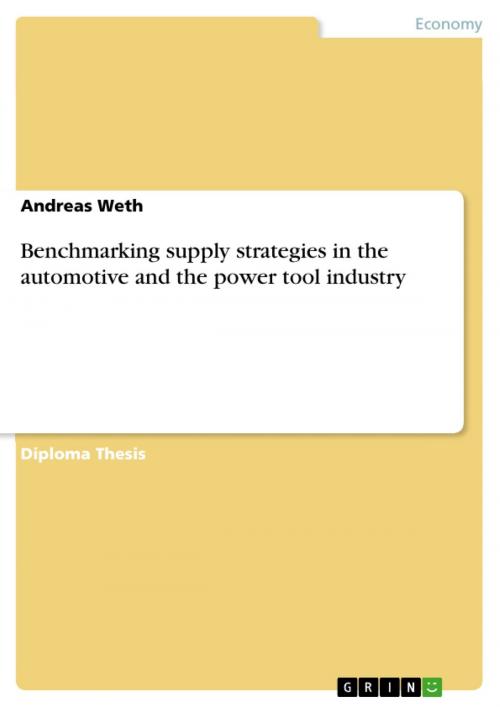Benchmarking supply strategies in the automotive and the power tool industry
Business & Finance, Management & Leadership, Production & Operations Management| Author: | Andreas Weth | ISBN: | 9783638019972 |
| Publisher: | GRIN Publishing | Publication: | March 11, 2008 |
| Imprint: | GRIN Publishing | Language: | English |
| Author: | Andreas Weth |
| ISBN: | 9783638019972 |
| Publisher: | GRIN Publishing |
| Publication: | March 11, 2008 |
| Imprint: | GRIN Publishing |
| Language: | English |
Diploma Thesis from the year 2006 in the subject Business economics - Supply, Production, Logistics, grade: 1.7, UNITEC New Zealand (Supply Management Institute (SMI)), course: Diplom, 105 entries in the bibliography, language: English, abstract: Problem Definition and Scope of the Diploma Thesis The problem which is addressed in this diploma thesis is the research deficit in the field of benchmarking supply and sourcing strategies. As it was stated in the introduction, no academic publication could be identified in which supply or sourcing strategies in the automotive industry are benchmarked with another industry and detailed recommendations for a particular industry are derived. This lack of academic research is related to a general research deficit in the whole field of supply management which was already identified by Wildemann (2000), Van Weele (2002) and Jahns (2005). The whole field of supply management cannot be entirely benchmarked within two industries in a diploma thesis. Because of that and to reduce complexity, the sourcing strategy triangle which is further explained in section 2.4 and shown in the following figure 2 was developed as a benchmarking framework. 1.3 Structure of the Diploma Thesis Firstly, chapter one provides an introduction including the problem definition (section 1.1), background information about the Hilti Corporation (section 1.2) and the structure of the diploma thesis (section 1.3). This is followed by supply management definitions and classifications which are given in chapter two of the thesis; supply management terminologies are defined (section 2.1), a supply strategy is explained in its strategic environment (section 2.2) and different supply management concepts are explained and analyzed (section 2.3). Besides that, also the sourcing strategy triangle which is used for the benchmarking approach is introduced in section 2.4. After that, chapter three includes the benchmarking analysis of the sourcing strategy triangle. In section 3.1, the applied benchmarking methodology is explained before the actual benchmarking analysis is pursued in section 3.2 which is divided into three sections according to the three elements of the sourcing strategy triangle: benchmarking global versus local sourcing (section 3.2.1), benchmarking supplier management (section 3.2.2) and benchmarking commodity management (section 3.2.3). Based on this benchmarking analysis, recommendations are derived for power tool companies in chapter four. Finally, a conclusion and an outlook into the future of the automotive and power tool industry together with supply management in both industries are given in chapter five.
Diploma Thesis from the year 2006 in the subject Business economics - Supply, Production, Logistics, grade: 1.7, UNITEC New Zealand (Supply Management Institute (SMI)), course: Diplom, 105 entries in the bibliography, language: English, abstract: Problem Definition and Scope of the Diploma Thesis The problem which is addressed in this diploma thesis is the research deficit in the field of benchmarking supply and sourcing strategies. As it was stated in the introduction, no academic publication could be identified in which supply or sourcing strategies in the automotive industry are benchmarked with another industry and detailed recommendations for a particular industry are derived. This lack of academic research is related to a general research deficit in the whole field of supply management which was already identified by Wildemann (2000), Van Weele (2002) and Jahns (2005). The whole field of supply management cannot be entirely benchmarked within two industries in a diploma thesis. Because of that and to reduce complexity, the sourcing strategy triangle which is further explained in section 2.4 and shown in the following figure 2 was developed as a benchmarking framework. 1.3 Structure of the Diploma Thesis Firstly, chapter one provides an introduction including the problem definition (section 1.1), background information about the Hilti Corporation (section 1.2) and the structure of the diploma thesis (section 1.3). This is followed by supply management definitions and classifications which are given in chapter two of the thesis; supply management terminologies are defined (section 2.1), a supply strategy is explained in its strategic environment (section 2.2) and different supply management concepts are explained and analyzed (section 2.3). Besides that, also the sourcing strategy triangle which is used for the benchmarking approach is introduced in section 2.4. After that, chapter three includes the benchmarking analysis of the sourcing strategy triangle. In section 3.1, the applied benchmarking methodology is explained before the actual benchmarking analysis is pursued in section 3.2 which is divided into three sections according to the three elements of the sourcing strategy triangle: benchmarking global versus local sourcing (section 3.2.1), benchmarking supplier management (section 3.2.2) and benchmarking commodity management (section 3.2.3). Based on this benchmarking analysis, recommendations are derived for power tool companies in chapter four. Finally, a conclusion and an outlook into the future of the automotive and power tool industry together with supply management in both industries are given in chapter five.















